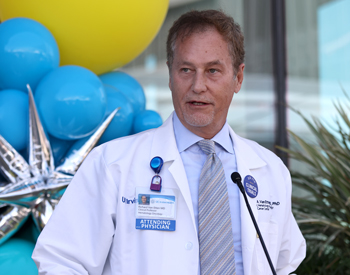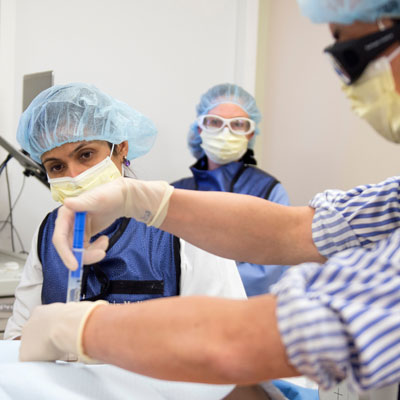Hernia Surgery Services
Hernia repairs are among the most common procedures in the United States, but that doesn't mean they are without risk. When you need hernia surgery, experience counts.
Our skilled UCI Health surgeons have performed thousands of simple and complex hernia repairs with successful outcomes.
They are among the most experienced in Orange County—and the region—in leading-edge, minimally invasive surgical procedures to repair hernias. When combined with regional anesthesia, laparoscopic procedures performed through dime-sized incisions can greatly reduce pain, recovery time and side effects.
They are experienced in performing traditional open as well as minimally invasive surgeries on all types of hernias, including ventral, inguinal and hiatal.
Our surgeons, working in concert with a highly trained support staff, are dedicated to ensuring that every patient receives individualized treatment in a caring and healing environment at UCI Medical Center, Orange County’s only university medical center.
To make an appointment, call 714-456-6262.
What is a hernia?
A hernia is a condition that occurs when an internal organ pushes through an opening or weakness in muscle tissue. They can be painful or cause no discomfort at all.
If a portion of the intestine becomes lodged in a muscle tear, the blood supply can be comprised with potentially life-threatening consequences.
Hernias are treated by repairing the area of weakness. The muscle and connective tissue may be sutured together to make a traditional repair.
More often, special mesh materials are used to patch the weak area and make a tension-free repair. The mesh is usually secured with sutures or staples. This technique helps strengthen the repair and decreases the rate of recurrence.
Depending on the individual case, our hernia experts may choose regional anesthesia, a technique that uses local nerve blocks rather than general anesthesia. The benefits of regional anesthesia include less pain, fewer side effects and faster overall recovery, especially when combined with minimally invasive laparoscopic surgery.
The type of hernia depends on its location. Hernias in the groin are the most common. Other types form in the abdomen. Hernias also can form on both sides of the body (bilateral hernias) or recur in the same spot (recurrent hernias). In some cases, patients may have more than one hernia at a time.
Your physician evaluates the type of hernia you have and considers your overall health to develop a treatment plan tailored to your needs.
Types of hernias
There are the four general types of hernias with differing methods of repair. They are:
Hiatal/paraesophageal hernias
A hiatal hernia occurs when the upper portion of the stomach protrudes into the chest cavity. The protrusion occurs through an opening of the diaphragm called the esophageal hiatus. The esophageal hiatus is usually only large enough to accommodate the esophagus. When it weakens or enlarges, the upper stomach can pass upward or even become trapped above the diaphragm.
There are two types of hiatal hernias:
- The sliding type
This type occurs when the upper stomach slides up through the esophageal hiatus during moments of increased pressure in the abdomen. Once the pressure is relieved, the stomach falls back to its normal position.
- The fixed type, also known as a paraesophageal hernia
This type occurs when a portion of the stomach remains stuck within the chest cavity—with no sliding up or down.
Treatment for both types usually involves a procedure to narrow the esophageal hiatus.
Ventral hernias
Ventral, or abdominal, hernias most often form around the navel or the site of a previous surgery. They include both incisional and umbilical hernias:
- Incisional hernias occur at the site of a previous surgical incision, anywhere on the abdomen.
If you have had prior surgery on your abdomen this type of hernia may occur at the site of your scar.
- Umbilical hernias occur in the umbilical ring around the navel.
The hernia is often present at birth, but it may also result from abdominal pressure during pregnancy, frequent coughing, being overweight and other factors. The primary symptom for this type of hernia is a bulge in the abdominal area that may be accompanied by pain or a dull ache when standing for prolonged periods of time, when doing heavy lifting, coughing or straining.
Both incisional and umbilical hernias can be repaired using a traditional surgical approach. More often, though, the surgeon uses a mesh device to make a tension-free repair.
Inguinal (groin) hernias
Groin hernias are the most common. Although both men and women can develop a groin hernia, they occur much more frequently in men.
There are two types of inguinal hernias: direct and indirect. Both form at or near a tunnel between the abdomen and groin called the inguinal canal. The primary symptom is a bulge in the groin area that may be accompanied by pain or a dull ache when standing for prolonged periods of time, when doing heavy lifting, coughing or straining.
Because these hernias form in the same area, your doctor may not be able to determine which type you have until surgery. In some cases, doctors use a traditional surgical approach to repair inguinal hernias. More often, a mesh device is used to make a tension-free repair. Over time, new tissue grows into the mesh. This helps strengthen the repair and prevents recurrence.
Parastomal hernias
Parastomal hernias occur around a stoma, a naturally or medically created opening in the body that connects the inside of the body to the exterior.
When a stoma is created during a colostomy or ileostomy, the abdominal walls are left to fit around the stoma tightly. In cases where the fit isn't tight enough or has loosened over time, a parastomal hernia can form. This is a common complication of a stoma, which is essentially an abdominal wall defect.
Our Physicians
UCI Health surgeons have specialized training in open and laparoscopic hernia repair techniques. Together, these skilled specialists have performed thousands of simple and complex hernia procedures with very successful outcomes.
Our specialists are leaders in the fields of laparoscopic surgery and regional anesthesia, both of which can greatly reduce pain, recovery time and side effects for patients undergoing hernia repairs.
Our hernia specialists include:









